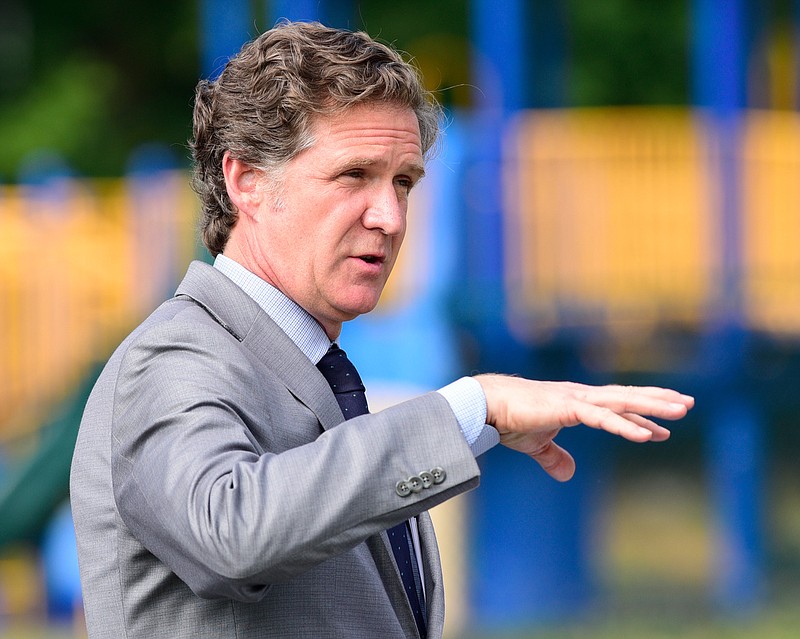Buried deep in the executive summary of Chattanooga Mayor Tim Kelly's first budget, under the heading of "Revenues Summary," are these words: "This budget was prepared using a property tax rate of $2.25 per $100 of assessed value."
Nowhere in the document does it say "tax increase," "tax rise," "tax hike" or, as this newspaper so gently put it, "a proposed $30 million increase in property tax revenue."
However, the reality is that, if the budget is passed as is, city property taxes will rise about 21% for many residents. For the owner of a $175,000 house, taxes will increase about $199 a year, according to Chief of Staff Brent Goldberg.
Kelly, questioned about the rate in a virtual editorial board meeting with Times Free Press reporters and editors last week, said, "It's cheaper than the old rate."
Yep, if the City Council approves the requested rate of $2.25 per $100 of assessed value, it would be cheaper than the $2.27 rate that homeowners paid this year. But 2021 was a reappraisal year for homes in Hamilton County, and the new certified rate by the state for the city is $1.8529.
By law, homeowners cannot see their taxes increased simply because the value of their home increases. So, every four years, the assessed value per $100 must be adjusted so that their property taxes don't increase.
That's where mayors and city councils get involved. They can ask that the new state-certified rate be affirmed or suggest that it be altered. That's what Kelly is doing.
It's what Hamilton County Mayor Jim Coppinger did in 2017. Except instead of burying the suggested rate deep in a budget document, he stood on the steps of the county courthouse, with several dozen people behind him, and said he wanted to keep the assessed rate where it was - in order to raise $25 million a year and purchase bonds to pay for new construction of schools, the jail and a sewage treatment plant.
"I truly believe we are at the crossroads and I think this is the right thing to do to keep this county moving ahead," he said, knowing he likely had the votes to pass his proposal. "To me, tax increases should absolutely be the last resort, and if I didn't feel that we were at that point, I certainly wouldn't ask for this increase. But my fear is we're going miss a huge opportunity if we don't act now."
We wish Kelly had done the same, because he has legitimate reasons for making the ask. Not everybody will agree with him, and certainly no one wants to see their taxes go up. But one thing he wants to do is align salaries for many city workers more along market rates. The city can't hire people to drive recycling trucks, or police the streets or put out fires because they frequently can get better paying jobs elsewhere.
If the budget is approved, it would bring in an additional $30 in revenue a year. Of that amount, according to the budget, raising the pay and benefits of new and experienced fire fighters would be $10 million a year. Raising the pay of new and experienced police personnel would be $10 million a year. And raising the pay of other city employees would be $10 million a year.
The budget also calls for a record of $10 million for street paving (and forecasts an equal amount for the rest of Kelly's term), an expense that despite huge increases during former Mayor Andy Berke administration was never able to keep up with the need.
Kelly, asked about the increase from the $1.85 rate set by the state, said that amount was "never a reality. It never really existed." He said mayors never keep state-adjusted rates.
Except they do. For example, earlier this month Hamilton County approved its new state certified property tax rate of $2.24 per $100 of assessed value, a 53-cent drop.
The city did not raise its property tax rate between 2001 and 2009, despite a reappraisal in 2005, and Coppinger until 2017 didn't hike property taxes for the first six years he was in office, despite a reappraisal in 2013.
However, for the last three appraisals, the city has voted to alter the state-certified rate. In 2010, then-Mayor Ron Littlefield, based on the 2009 appraisal, requested a rise of 64 cents for every $100 of assessed value. The city council cut that ask to 37 cents and passed it 6-3. In 2013, the city actually reduced property taxes by not quite half a penny. But in 2017, the city raised taxes by nearly 22 cents per $100 of assessed value - about a 10.7% rise - and passed it 8-1.
Kelly already has announced several worthy projects that are reflected in his budget - including the building of a construction workforce center and a schools initiative that will address the wider needs of children - and other changes that will rearrange city government to his and his administration's liking.
He said he has cut some expenses out of Berke's previous budget and ordered department heads to "dig into the couch cushions" to find savings.
In the end, we think most people are like the ranter, whose contribution may be found in our Perspective section today. That ranter said: "An 18% tax increase for Chattanoogans coming up: I support it if our streets get safer and roads are paved and repaired."
We just wish Kelly had been more up front about what he wanted to do. He told editors and reporters the situation was "somewhat desperate" and that the tax increase "absolutely has to happen."
Tell your constituents, Mr. Mayor, and tell them why. You might be surprised how they react.
